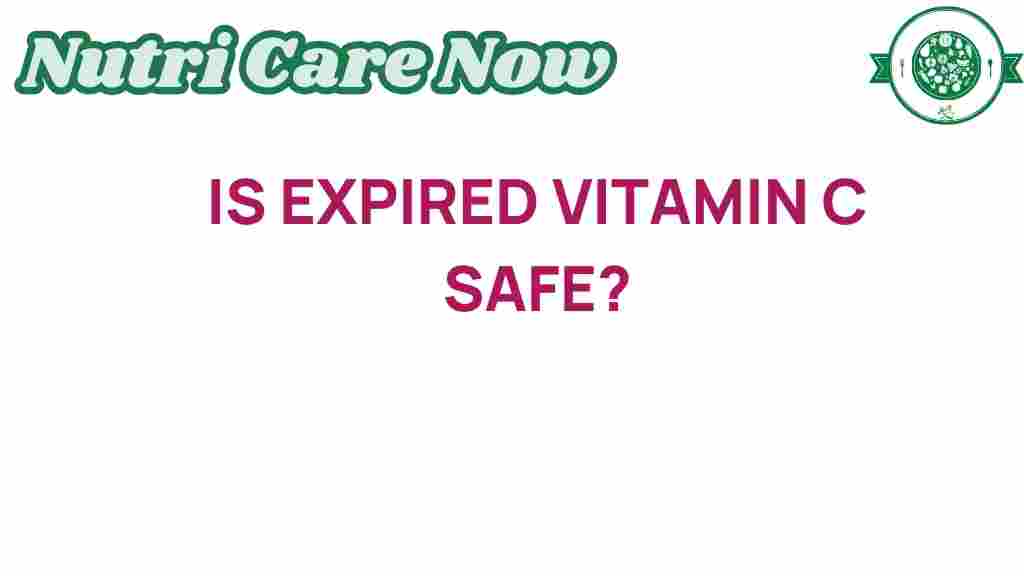Is Expired Vitamin C Safe? Understanding the Risks and Realities
Vitamin C is one of the most popular dietary supplements, known for its immune-boosting properties and antioxidant benefits. However, many consumers often wonder about the safety of taking expired vitamin C. If you’ve ever found a bottle of vitamin C in your cabinet and noticed that it’s past its expiration date, you’re not alone in questioning its safety and efficacy. In this article, we’ll delve into the truth behind expired vitamin C, addressing its safety, shelf life, and the importance of consumer awareness regarding supplements.
Understanding Vitamin C and Its Importance
Vitamin C, or ascorbic acid, is a water-soluble vitamin essential for numerous bodily functions, including:
- Boosting the immune system
- Promoting collagen production for healthy skin
- Acting as a powerful antioxidant
- Aiding in the absorption of iron from plant-based foods
Given its importance, many individuals choose to supplement their diets with vitamin C, especially during cold and flu season or to support overall health. However, understanding the safety of these supplements, particularly when they are expired, is crucial.
The Shelf Life of Vitamin C Supplements
Like all dietary supplements, vitamin C has a shelf life, which is the period during which the product is expected to remain effective and safe to consume. The shelf life of vitamin C supplements can vary based on several factors:
- Formulation: Vitamin C comes in various forms, including tablets, capsules, powders, and chewables. Each form may have a different shelf life.
- Storage conditions: Exposure to heat, humidity, and light can affect the potency of vitamin C. Ideally, it should be stored in a cool, dry place.
- Packaging: Proper packaging helps protect vitamin C from environmental factors that can lead to degradation.
Generally, vitamin C supplements have a shelf life of about 2 to 3 years from the date of manufacture. After this period, the potency may diminish, but it does not necessarily mean that the product is unsafe.
Safety Concerns of Expired Vitamin C
When considering whether expired vitamin C is safe, it’s essential to look at both the potential health risks and the general guidelines for consuming expired supplements.
Potency vs. Safety
One of the main concerns with expired vitamin C is its potency. Over time, vitamin C can degrade, leading to a decrease in its effectiveness. However, this degradation does not usually result in harmful byproducts. Most studies indicate that expired vitamin C is unlikely to pose a significant health risk, although it may not provide the desired health benefits.
Health Risks Associated with Expired Supplements
While taking expired vitamin C is generally considered safe, there are a few potential risks to be aware of:
- Reduced Efficacy: The primary concern is that the vitamin may not work as intended, which could lead you to consume more, thinking you’re not getting enough.
- Contamination: If the bottle has been opened or improperly stored, there’s a risk of contamination with bacteria or mold, which could pose health risks.
- Allergic Reactions: Although rare, some individuals may experience allergic reactions to degraded supplements.
To mitigate these risks, always inspect your vitamin C supplements before consumption, even if they are technically expired.
How to Check Expired Vitamin C for Safety
If you find yourself with expired vitamin C, follow these steps to assess its safety:
- Check the expiration date: Is it just past the expiration date or has it been years?
- Inspect the appearance: Look for any discoloration, changes in texture, or visible signs of mold.
- Smell the supplement: A strange or off-putting smell may indicate spoilage.
- Consider storage conditions: If the supplement has been stored properly, it may still be safe to consume.
Consumer Awareness and Best Practices
As a consumer, being informed about your supplements is vital. Here are some best practices to ensure your vitamin C supplements remain safe and effective:
- Purchase from reputable brands: Choose well-known brands that follow good manufacturing practices (GMP).
- Store properly: Keep your supplements in a cool, dark place, away from moisture.
- Follow dosage recommendations: Adhere to the recommended intake to maximize benefits and minimize risks.
- Stay informed: Regularly check expiration dates and replace expired products.
Troubleshooting Tips for Expired Vitamin C
If you have expired vitamin C and are unsure whether to take it, consider the following troubleshooting tips:
Consult with a Healthcare Professional
If you are uncertain about taking expired supplements, consult a healthcare provider for personalized advice based on your health history and dietary needs.
Consider Alternative Sources of Vitamin C
If you decide against taking expired vitamin C, consider increasing your intake of natural sources of vitamin C, such as:
- Citrus fruits (oranges, lemons, grapefruits)
- Bell peppers
- Strawberries
- Kale and other leafy greens
These foods not only provide vitamin C but also offer other important nutrients and health benefits.
Conclusion: Making Informed Choices about Expired Vitamin C
In conclusion, while expired vitamin C is generally considered safe to consume, it’s essential to evaluate its potency and any potential risks. The efficacy may diminish after the expiration date, but the risks of taking it are typically low. By understanding the shelf life of your supplements, regularly checking for expiration dates, and being aware of proper storage conditions, you can make informed choices that support your health.
For more information on vitamins and safe supplement practices, consider visiting this resource. Remember, your health is paramount, and being proactive about your vitamin intake is key to achieving optimal wellness.
Stay informed, stay healthy, and always prioritize safety in your supplement choices!
This article is in the category Supplements and created by NutriCareNow Team
